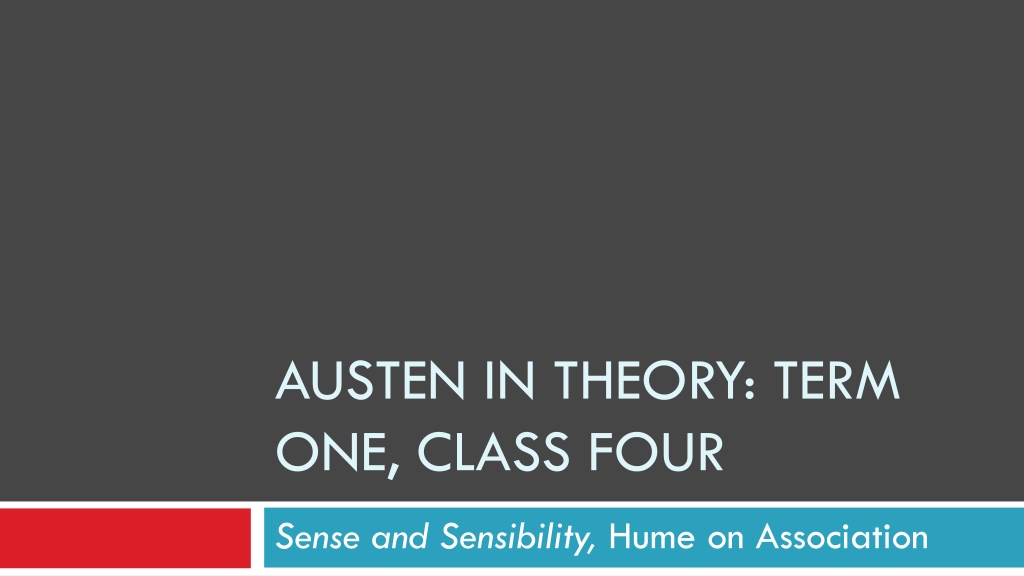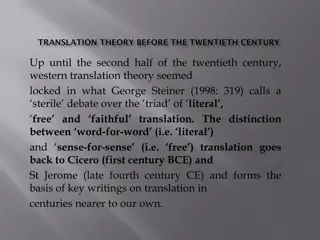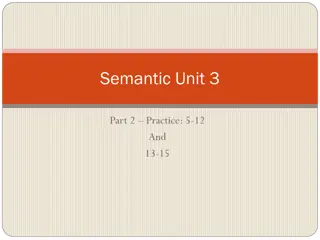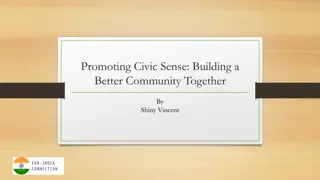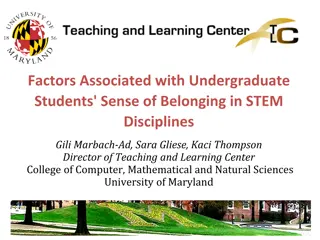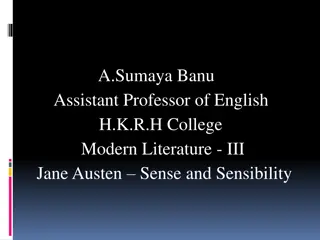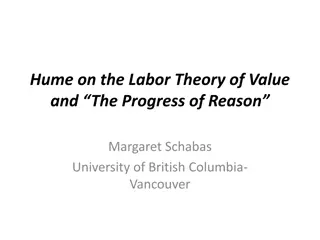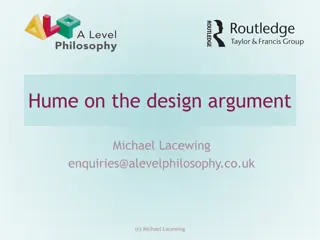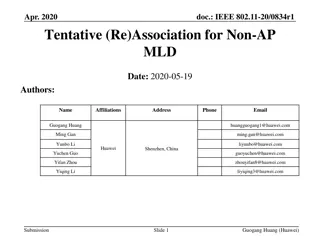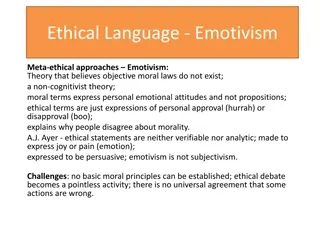Exploring Sense and Sensibility: Hume's Theory of Association
Delve into the connection between Sense and Sensibility in Austen's works and Hume's theory of association. Hume's emphasis on immediate experience aligns with Austen's plots, showcasing a coherence in their perspectives. The principle of connection between thoughts and ideas is highlighted, emphasizing the method and regularity in the flow of thoughts. The interaction between perception and memory, and the intricate relations between different ideas, are key themes discussed.
Download Presentation

Please find below an Image/Link to download the presentation.
The content on the website is provided AS IS for your information and personal use only. It may not be sold, licensed, or shared on other websites without obtaining consent from the author. Download presentation by click this link. If you encounter any issues during the download, it is possible that the publisher has removed the file from their server.
E N D
Presentation Transcript
AUSTEN IN THEORY: TERM ONE, CLASS FOUR Sense and Sensibility, Hume on Association
Hume, 1748: "A virtuous horse we can conceive; because, from our own feeling, we can conceive virtue; and this we may unite to the figure and shape of a horse, which is an animal familiar to us."
Some primary arguments Emphasis on immediate experience: inevitably more vivid than experience in reflection In Marilyn Butler terms: Hume emphasizes impressions, putting him slightly at odds with her version of Austen and yet Hume s account of familiarity through experience coheres with Austen s plots
It is evident, that there is a principle of connexion between the different thoughts or ideas of the mind, and that, in their appearance to the memory or imagination, they introduce each other with a certain degree of method and regularity
In our more serious thinking or discourse, this is so observable, that any particular thought, which breaks in upon the regular tract or chain of ideas, is immediately remarked and rejected. And even in our wildest and most wandering reveries, nay in our very dreams, we shall find, if we reflect, that the imagination ran not altogether at adventures, but that there was still a connexion upheld among the different ideas, which succeeded each other. Were the loosest and freest conversation to be transcribed, there would immediately be observed something, which connected it in all its transitions. Or where this is wanting, the person, who broke the thread of discourse, might still inform you, that there had secretly revolved in his mind a succes- sion of thought, which had gradually led him from the subject of conversa- tion. Among different languages, even where we cannot suspect the least connexion or communication, it is found, that the words, expressive of ideas, the most compounded, do yet nearly correspond to each other: A certain proof, that the simple ideas, comprehended in the compound ones, were bound together by some universal principle, which had an equal influence on all mankind.
Every one will readily allow, that there is a considerable difference between the perceptions of the mind, when a man feels the pain of excessive heat, or the pleasure of moderate warmth, and when he afterwards recalls to his memory this sensation, or anticipates it by his imagination. These faculties may mimic or copy the perceptions of the senses; but they never can entirely reach the force and vivacity of the original sentiment. The utmost we say of them, even when they operate with greatest vigour, is, that they represent their object in so lively a manner, that we could almost say we feel or see it: But, except the mind be disordered by disease or madness, they never can arrive at such a pitch of vivacity, as to render these perceptions altogether undistinguishable. All the colours of poetry, however splendid, can never paint natural objects in such a manner as to make the description be taken for a real landscape. The most lively thought is still inferior to the dullest sensation.
Section 3: 9: But the most usual species of connexion among the different events, which enter into any narrative composition, is that of cause and effect; while the historian traces the series of actions according to their natural order, remounts to their secret springs and principles, and delineates their most remote consequences. He chooses for his subject a certain portion of that great chain of events, which compose the history of mankind: Each link in this chain he endeavours to touch in his narration: Sometimes unavoidable ignorance renders all his attempts fruitless: Sometimes, he supplies by con- jecture, what is wanting in knowledge: And always, he is sensible, that the more unbroken the chain is, which he presents to his reader, the more perfect is his production. He sees, that the knowledge of causes is not only the most satisfactory; this relation or connexion being the strongest of all others; but also the most instructive; since it is by this knowledge alone, we are enabled to controul events, and govern futurity.
Practical Hume: "The great subverter of Pyrrhonism or the excessive principles of skepticism is action, and employment, and the occupations of common life. These principles may flourish and triumph in the schools; where it is, indeed, difficult, if not impossible, to refute them. But as soon as they leave the shade, and by the presence of the real objects, which actuate our passions and sentiments, are put in opposition to the more powerful principles of our nature, they vanish like smoke, and leave the most determined skeptic in the same condition as other mortals."
4 As man is a reasonable being, and is continually in pursuit of happiness, which he hopes to attain by the gratification of some passion or affection, he seldom acts or speaks or thinks without a purpose and intention. He has still some object in view; and however improper the means may sometimes be, which he chooses for the attainment of his end, he never loses view of an end; nor will he so much as throw away his thoughts or reflections, where he hopes not to reap some satisfaction from them. undertaking. 7 This connecting principle among the several events, which form the subject of a poem or history, may be very different, according to the different designs of the poet or historian. Ovid has formed his plan upon the connect- ing principle of resemblance. Every fabulous transformation, produced by the miraculous power of the gods, falls within the compass of his work. There needs but this one circumstance in any event to bring it under his original plan or intention. 5 In all compositions of genius, therefore, it is requisite, that the writer have some plan or object; and though he may be hurried from this plan by the vehemence of thought, as in an ode, or drop it carelessly, as in an epistle or essay, there must appear some aim or intention, in his first setting out, if not in the composition of the whole work. A production without a design would resemble more the ravings of a madman, than the sober efforts of genius and learning. 8 An annalist or historian, who should undertake to write the history of Europe during any century, would be influenced by the connexion of conti- guity in time and place. All events, which happen in that portion of space and period of time, are comprehended in his design, though in other respects dif- ferent and unconnected. They have still a species of unity, amidst all their diversity. 6 As this rule admits of no exception, it follows, that, in narrative composi- tions, the events or actions, which the writer relates, must be connected together, by some bond or tye: They must be related to each other in the imagination, and form a kind of Unity, which may bring them under one plan or view, and which may be the object or end of the writer in his first
Section 6, Of Probability Though we give the preference to that which has been found most usual, and believe that this effect will exist, we must not overlook the other effects, but must assign to each of them a particular weight and authority, in proportion as we have found it to be more or less frequent. It is more probable, in almost every country of Europe, that there will be frost sometime in January, than that the weather will continue open throughout that whole month; though this probability varies according to the different climates, and approaches to a certainty in the more northern kingdoms. Here then it seems evident, that, when we transfer the past to the future, in order to determine the effect, which will result from any cause, we transfer all the different events, in the same proportion as they have appeared in the past, and conceive one to have existed a hundred times, for instance, another ten times, and another once. As a great number of views do here concur in one event, they fortify and confirm it to the imagination, beget that sentiment which we call belief, and give its object the preference above the contrary event, which is not supported by an equal number of experiments, and recurs not so frequently to the thought in transferring the past to the future.
Where might we observe this in Austen? The events of this evening were not very remarkable. The party, like other musical parties, comprehended a great many people who had real taste for the performance, and a great many more who had none at all; and the performers themselves were, as usual, in their own estimation, and that of their immediate friends, the first private performers in England.
Inference: The young ladies arrived: their appearance was by no means ungenteel or unfashionable. Their dress was very smart, their manners very civil, they were delighted with the house, and in raptures with the furniture, and they happened to be so doatingly fond of children that Lady Middleton's good opinion was engaged in their favour before they had been an hour at the Park. She declared them to be very agreeable girls indeed, which for her ladyship was enthusiastic admiration. Sir John's confidence in his own judgment rose with this animated praise, and he set off directly for the cottage to tell the Miss Dashwoods of the Miss Steeles' arrival, and to assure them of their being the sweetest girls in the world. From such commendation as this, however, there was not much to be learned; Elinor well knew that the sweetest girls in the world were to be met with in every part of England, under every possible variation of form, face, temper and understanding. Sir John wanted the whole family to walk to the Park directly and look at his guests. Benevolent, philanthropic man! It was painful to him even to keep a third cousin to himself.
Inference: As Elinor was neither musical, nor affecting to be so, she made no scruple of turning her eyes from the grand pianoforte, whenever it suited her, and unrestrained even by the presence of a harp, and violoncello, would fix them at pleasure on any other object in the room. In one of these excursive glances she perceived among a group of young men, the very he, who had given them a lecture on toothpick-cases at Gray's. She perceived him soon afterwards looking at herself, and speaking familiarly to her brother; and had just determined to find out his name from the latter, when they both came towards her, and Mr. Dashwood introduced him to her as Mr. Robert Ferrars. He addressed her with easy civility, and twisted his head into a bow which assured her as plainly as words could have done, that he was exactly the coxcomb she had heard him described to be by Lucy. Happy had it been for her, if her regard for Edward had depended less on his own merit, than on the merit of his nearest relations! For then his brother's bow must have given the finishing stroke to what the ill-humour of his mother and sister would have begun. But while she wondered at the difference of the two young men, she did not find that the emptiness of conceit of the one, put her out of all charity with the modesty and worth of the other. Why they WERE different, Robert exclaimed to her himself in the course of a quarter of an hour's conversation; for, talking of his brother, and lamenting the extreme GAUCHERIE which he really believed kept him from mixing in proper society, he candidly and generously attributed it much less to any natural deficiency, than to the misfortune of a private education; while he himself, though probably without any particular, any material superiority by nature, merely from the advantage of a public school, was as well fitted to mix in the world as any other man.
Marianne, at conclusion, agrees to give over to proof: Here ceased the rapid flow of her self-reproving spirit; and Elinor, impatient to soothe, though too honest to flatter, gave her instantly that praise and support which her frankness and her contrition so well deserved. Marianne pressed her hand and replied, "You are very good. The future must be my proof. I have laid down my plan, and if I am capable of adhering to it my feelings shall be governed and my temper improved. They shall no longer worry others, nor torture myself. I shall now live solely for my family. You, my mother, and Margaret, must henceforth be all the world to me; you will share my affections entirely between you. From you, from my home, I shall never again have the smallest incitement to move; and if I do mix in other society, it will be only to shew that my spirit is humbled, my heart amended, and that I can practise the civilities, the lesser duties of life, with gentleness and forbearance. As for Willoughby to say that I shall soon or that I shall ever forget him, would be idle. His remembrance can be overcome by no change of circumstances or opinions. But it shall be regulated, it shall be checked by religion, by reason, by constant employment."
Some conclusions Hume s Enquiry highlights how Austen s characters reason from partial information; how social connections are epistemology Issues: how do characters in particular, how do women form their associations?
Sense and Sensibility reading: paragraph, opening 1. The family of Dashwood had long been settled in Sussex. 2. Their estate was large, and their residence was at Norland Park, in the centre of their property, where, for many generations, they had lived in so respectable a manner as to engage the general good opinion of their surrounding acquaintance. 3. The late owner of this estate was a single man, who lived to a very advanced age, and who for many years of his life, had a constant companion and housekeeper in his sister. 4. But her death, which happened ten years before his own, produced a great alteration in his home; for to supply her loss, he invited and received into his house the family of his nephew Mr. Henry Dashwood, the legal inheritor of the Norland estate, and the person to whom he intended to bequeath it. 5. In the society of his nephew and niece, and their children, the old Gentleman s days were comfortably spent. His attachment to them all increased. The constant attention of Mr. and Mrs. Henry Dashwood to his wishes, which proceeded not merely from interest, but from goodness of heart, gave him every degree of solid comfort which his age could receive; and the cheerfulness of the children added a relish to his existence. 1. Read as deeply as you can into your assigned sentence. What are the key verbs, nouns, and adjectives? Who are the actors, and what qualities do they possess? 2. Produce a weird, extreme, even unfair close reading of one of the words in your sentence. Make your wildest, most showoff-y speculative reading. 3. Talk about time in your sentence the relationship between past and present, and if possible future. 4. How does this sentence set up something in the book to come?
